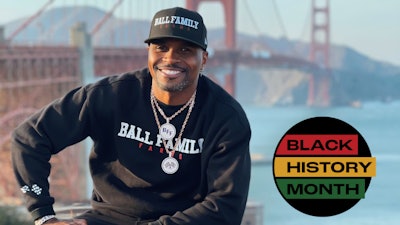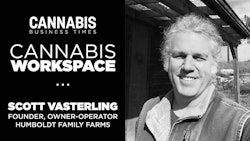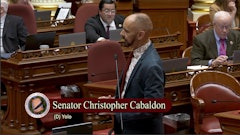
Editor's note: Chris Ball is a member of the 2023 Advisory Board for Cannabis Conference, the industry's leading event for plant-touching businesses, which will be held Aug. 15-17 at the Paris Las Vegas Hotel & Casino. For more information and to register, visit CannabisConference.com.
Chris Ball, a former professional football player in the Canadian football league and now the owner and CEO of Ball Family Farms, a vertically integrated, Black-owned cannabis operation based in Los Angeles, is all too familiar with the concept of social equity in the industry.
Ball served prison time for trafficking cannabis from Canada to his hometown of LA before launching Ball Family Farms in 2018 as one of the first Black social equity licensees in the city.
From his social equity experience in LA and observations from other social equity programs across California and beyond, Ball says these programs leave much to be desired in the way of supporting minority-owned businesses and helping them reach their full potential.
“We need reform,” he says. “I want to be clear that my stance is that we need social equity reform. The city and the state really need to put some energy and some dollars into this and really make this important because a lot of people have been negatively impacted by the war on drugs. I say it all the time that there are a lot more Chris Balls out there in this industry and they just need the opportunity. I just want the city and the state to make it fair. Give us a chance. Give us a chance to succeed, give us a chance to win, and you’ll be surprised at how many more social equity businesses emerge.”
Here, Ball discusses the obstacles that often hinder minority-owned businesses, why social equity programs often miss the mark in removing these obstacles and what can be done about it.
Melissa Schiller: What are some of the challenges that social equity business operators face when launching a business in the cannabis industry?
Chris Ball: Those would be a lack of funds, a lack of tutelage or mentorship—I think those would probably be the main two. I’ve been giving the same metaphor for five years now when I talk about what social equity is missing, and the metaphor is when I got my football scholarship to Berkeley. Being an inner-city kid and coming from a lower-class family without the means, Berkeley accepted me into the school and gave me my scholarship, but they also gave me free housing, they fed me three times a day, they paid for all of my books, they paid for all of my tutors. It was that type of assistance that allowed me to learn at a higher level, and it allowed me to be successful in school. If I didn’t have those things and they just accepted me to the college but didn’t provide me with the resources, I would have probably flunked out. There was no way my parents could afford the rent; there was no way they could afford to feed me [and] there was no way they could pay for tutors.
I think the main thing with social equity [is] it’s already bad enough that we’re only allotted a certain amount of licenses in the space, but also [it’s] the way that it’s structured, the licensing process. If I’m a social equity applicant and I have to own 51%, what person is going to give me some money, and they only get to own 49%? I’m the controlling member of their money, so they’ve got to trust me a whole, whole lot. And if I’m social equity, that means I come from a disenfranchised area, which means my education may not be at the level that I need to run a business of that magnitude or even run that type of money and know how to manage it and deploy it.
There needs to be some sort of mentorship, leadership [and] tutelage for these applicants so that when they do maybe link up with someone that wants to help finance, or they’re going to partner up, [it’s], “Hey, I have the license and I’m social equity,” and then the money comes in, [and] there’s someone there to say, “OK, here’s how we’re going to deploy the money.” Someone’s going to get in the middle of those predatory practices that maybe get applied to that social equity applicant.
I think funding and resources are something that’s still not being given to social equity applicants all across the United States.
MS: Can you describe your experience with Los Angeles’ social equity program? In what ways did that program help you get your business off the ground, and in what ways could it have provided better support?
CB: With LA, it helped me get it off the ground because they allowed me to have [the license], for one. I’m very grateful that they even adopted the social equity program. But as far as helping me get it off the ground, there really wasn’t any help.
I think, for the most part, if I’m being completely transparent, they really didn’t know much about it when I launched back in 2018. When the inspectors came by, and they were looking to make sure we were compliant with this and that, they didn’t really know what they were looking at, at that point. And for us, for a person who’s been growing and doing this for a very long time, I think I had an advantage. I understood what was wrong with my grow when my inspectors didn’t. That wound up playing to my advantage back then because they really had no idea what they were looking at. It gave me time to get my ducks in a row, to dot my I’s and cross my T’s and get right.
RELATED: From Legacy Kingpin to Successful CEO
I’m not really a fan of too much of the program in Los Angeles because I think it’s so broken. I think, if anything, it’s tried to hinder me from being successful with all the things that we’ve had to go through over the past five years and that we’re still going through.
MS: What would you like to see included in a social equity program to best support minority-owned businesses in the cannabis space?
CB: They need to develop some sort of program where a person like me, who’s gone through the social equity program and who knows exactly what’s coming, who knows the pitfalls, who knows how to get a company off the ground—they need to put together some sort of group of individuals who’ve made it through the program and have had success and maybe give us some sort of incentive to want to help these other individuals, whether it’s a tax break [or] some sort of priority down at the city when we need to get some plans or some permits or some fees paid.
When I was in school, when a scholarship kid would come, when the school was courting a new athlete, they would get one of the athletes that’s been on the team for a while—one of the captains or one of the veterans—and they would give the veteran money and say, “Go take out the rookie. Go take out the recruit that we’re trying to schmooze to come to this school.” The player that’s already been on the team got money out of the deal. The coach put that faith in him and said, “Here’s a couple bucks. You guys go out and have a good time and get him to sign to our school.”
If the city and the state were to offer something like that to guys like myself—at the end of the day, yes, I want to see other social equity applicants get into this space, and I want to see them win, but that means that it’s going to take that time away from my business, as well. So, there needs to be some kind of incentive beyond my heart. I’m a guy who has a big heart and I want to teach them, but each one is also not built like me. So, if there were some kind of incentive where the city were to say, “OK, if you participate in this mentorship program for other social equity applicants, we’re going to do this for you and your company at Ball Family Farms, or we’re going to highlight you, or you get to go to the city and get your plans and your permits to the front of the line, where you get a response in two weeks as opposed to two months”—just something creative like that.
These people need help. More than anything, there needs to be funding. This really comes down to money. How’s a social equity applicant supposed to get their business off the ground if there’s no money, if the city’s not offering any financial support? If schools did that, they’d have no athletes. It wouldn’t work, and that’s why this isn’t working.
MS: Do you think any state or local markets are doing it right?
CB: I think Oakland. They were the first ones out of the gate to do it, and I think they’ve got a better handle on it than we do down here in Los Angeles. I’m not too familiar with how all the other states’ social equity programs are working in detail because we’re here [in California]. We’re licensed in Oklahoma, and we didn’t need to be social equity—they were just giving [licenses] away. I do know there’s a program open in Chicago. I have some colleagues over in Chicago, and they complain about the process, about how they’re choosing licenses with some sort of score method or merit[-based] method. So, I haven’t really heard many positive things about social equity anywhere besides the fact that we have it, but there’s nothing we can really do with it.
MS: What are some of Ball Family Farms’ goals this year?
CB: Ball Family Farms is in the process of coming up with a new IP for our cultivation practices. We’re very excited about it. We’re very excited about this new secret sauce that we can figure out where we can push higher quality flower, higher yielding flower.
We used to only grow up to four to six strains, but now I’ve identified about 16 new, different strains, so we’re going to change up our methods as far as what kind of strains we put out and when. We’re going to put out more niche strains per quarter each year just to keep our followers and our consumers guessing, keep them with something fresh, something new to try, a different terpene profile.
We’re having some talks about entering into the New York market. We’ve been talking to a couple cultivators over there who I really like, who want to bring the brand and expand the brand over into New York. There are a couple really good collaborations coming up this year. Last year, in [the] fourth quarter, we launched our Ricky Williams collaboration called Ricky, but I got a couple more big ones coming up this year.
We have been working on our direct-to-consumer platform now, too, over the past couple [of] months. Hopefully, we’ll be able to launch with that by the summertime. The dispensary game has been disappointing for us because dispensaries get to mark your products up for their margin, and sometimes that margin outflanks a lot of consumers, especially with the state of our economy right now. People aren’t throwing a bunch of money around. We want to be able to control our price point. We’ve gone into some dispensaries and have seen our product marked up 200% to 300%. We want to make sure all our followers and consumers can get our products at a decent price so that they can enjoy our flower. And we make more money, too, so it’s a win-win. We’re trying to cut out the middleman.
We’re still here fighting. We’re like the little engine that could. We’re still the people’s champ when it comes to social equity. We’ve had to deal with a lot of adversity over the last 18 months with price compression and how the market is right now, but we’re still alive. Things are looking up. Things are getting better. So, we hope in the next three or four months, when we get this new IP in, and we get these new genetics running, that we can make a re-splash in 2023 with a good marketing campaign and show the world that Ball Family Farms is still here, alive and well.
Editor’s note: This interview has been edited for style, length and clarity.


























